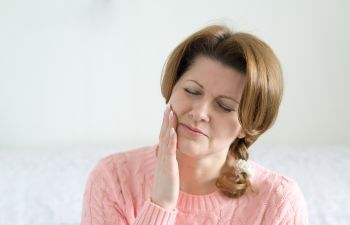
Do you wake up with a sore or stiff jaw? Does your jaw produce a painful pop when you yawn? Do you suffer from tension headaches, ear pain or neck discomfort? These are all symptoms of TMD, or temporomandibular joint disorder. The TMJ, otherwise known as the “jaw joint,” is the joint that allows you to open and close your mouth. If you speak, eat and yawn on a daily basis, you are giving your jaw joint a tremendous amount of use.
While the TMJ is intended to withstand everyday chewing without problems, there are certain habits and situations that can be excessive strain on this joint. Teeth grinding, a bad bite and accidental trauma to the jaw can cause dysfunction of the TMJ. This can lead to irritation within the muscles and nerves that surround this joint. Unfortunately, the outwards symptoms can be quite disruptive – especially if your TMJ disorder worsens or persists after basic home remedies.
Immediate Steps
If you’re new to jaw pain or jaw clicking, you may want to try some conservative measures at home to relieve your symptoms. This should include temporarily limiting your jaw movement so that your chompers can get some rest. In doing so, try to avoid chewing gum and stick to softer foods that don’t require lengthy chewing or hard crunching. You may also try to place ice or heat on your jaw as well as consider taking over-the-counter ibuprofen to reduce pain and inflammation. Your doctor may even prescribe a short therapy of muscle relaxers to calm the joint.
Investigating the Cause
If your jaw issues don’t go away or quickly return after conservative treatment on your own, it may be time to seek professional treatment. This almost always includes a dentist who will investigate the specific cause of your TMJ malfunction. Determining the culprit can guide the most successful and lasting plan to relief.
Getting Professional Treatment
The good news is that TMJ/TMD is typically treated with therapies that do not require medication. Occlusal appliances, such as mouth guards or oral splints, can be used to stop the upper and lower teeth from touching. This is especially important if the patient is grinding or clenching their teeth during the night.
Since bruxism (teeth grinding) is often a stress-induced habit. You may benefit from stress management techniques to alleviate your jaw pain. In other cases, physical therapy can be considered as a means to stretch and strengthen the jaw muscles. Finally, if a misaligned bite is causing your jaw strain, orthodontic treatment can be the most permanent solution.
At Green Dental of Alexandria, we proudly offer specialized treatment for jaw pain and TMD. We are keenly aware of the discomfort and disruption that this condition can bring patients of all ages. Call today to learn your TMJ treatment options.
Posted on behalf of
1725 Duke St, Suite GR03
Alexandria, VA 22314
Phone: (703) 549-1725
Email: info@greendentalalexandria.com
